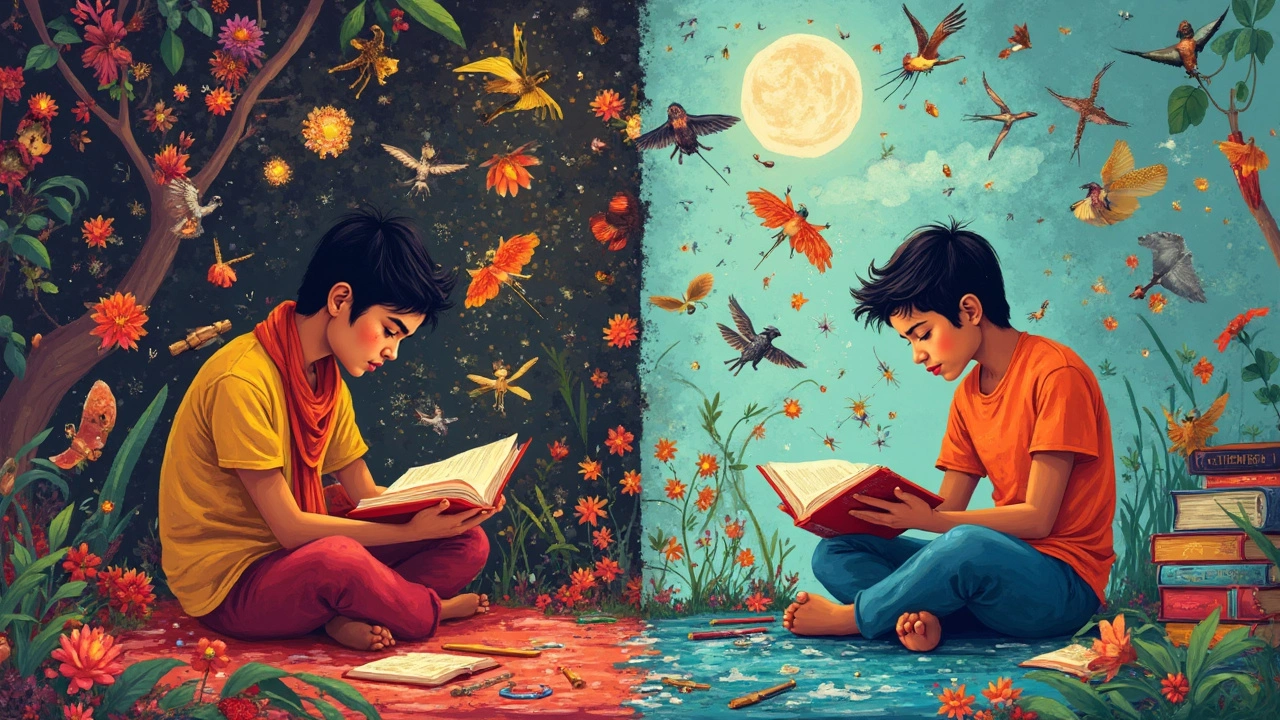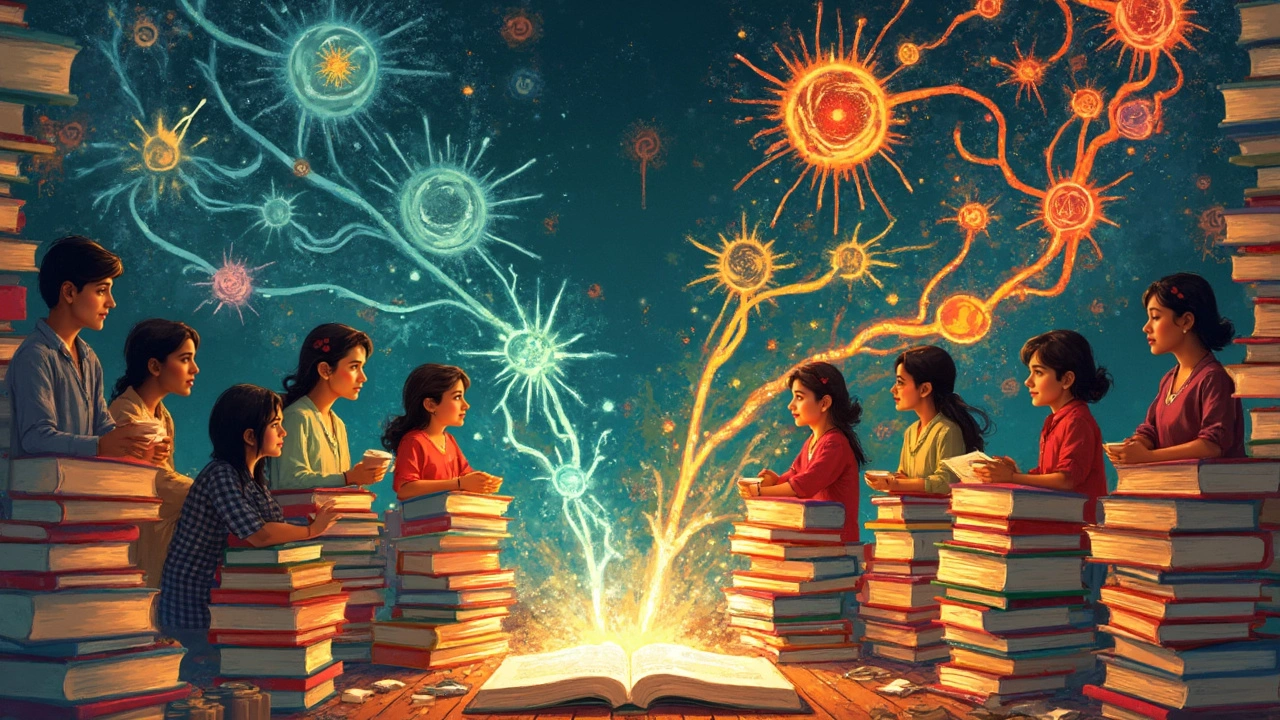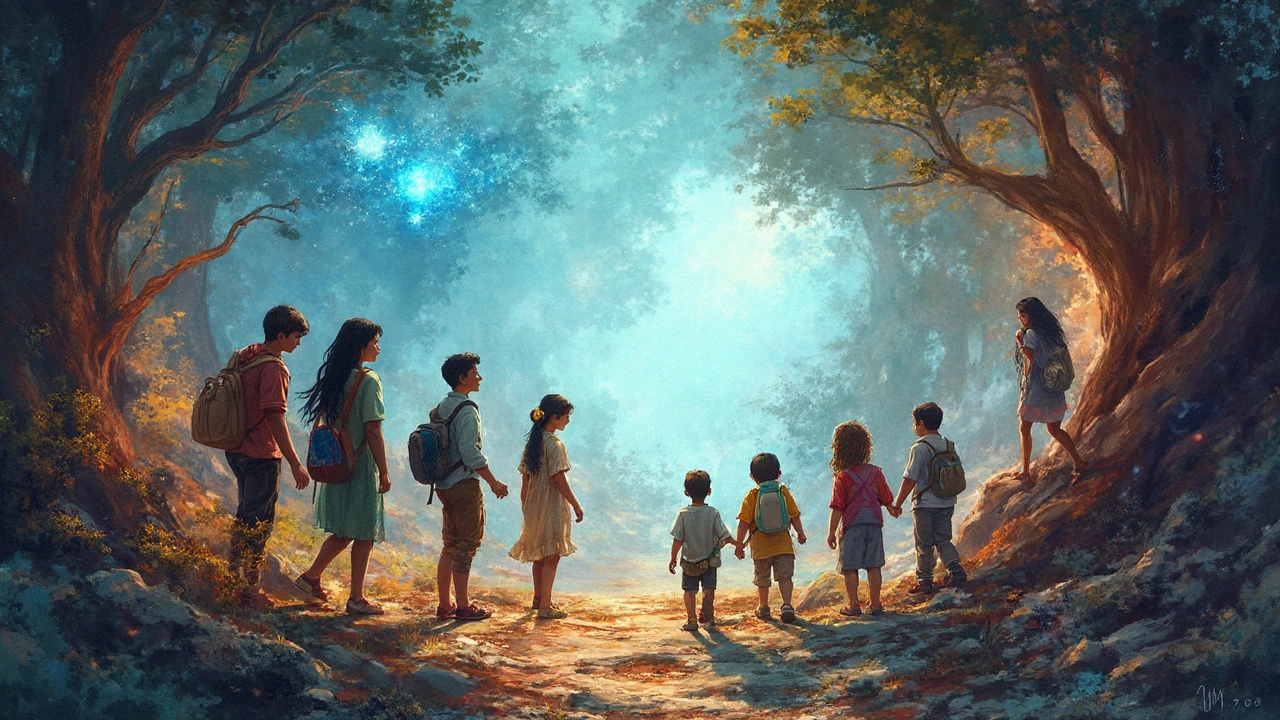
Ever found yourself scratching your head trying to figure out what makes literary fiction different from non-literary fiction? It's a bit like comparing a sophisticated art film to a blockbuster action movie. While both are entertaining, they dish out different experiences. Literary fiction is all about diving deep into characters’ minds and exploring themes in an intricate way. It’s more about the journey and less about the destination.
In contrast, non-literary fiction tends to prioritize plot over character development. Think of it as the page-turners that keep you on the edge of your seat with their twists and turns. These books don’t often dwell on the deeper implications or hidden meanings but focus on engaging you with a gripping storyline. Intrigued? Let’s break down these genres a bit more to see what makes each tick.
- Understanding Literary Fiction
- Exploring Non-Literary Fiction
- Character vs. Plot Focus
- Themes and Messages
- Impact on Readers
Understanding Literary Fiction
So, what's the big deal about literary fiction? It's kind of like the art gallery of the book world. These stories are less about fast-paced action and more about peeling back the layers of human experience. Every word is carefully chosen, creating a tapestry of deeper understanding about life and human relationships. Characters in literary fiction are often deeply complex, giving readers a chance to connect on an emotional level.
Another cool thing about literary fiction is how it tackles big themes. These stories often explore concepts like identity, morality, and society. They don't just skate over the surface; they dig deep. For instance, works like To Kill a Mockingbird by Harper Lee dive into issues of racial injustice, creating lasting discussions among readers.
Many authors in this genre enjoy playing with language and structure. Think about James Joyce with his stream-of-consciousness style in Ulysses. Not everything might be straightforward or tied up perfectly at the end, but that's part of the charm. It's about the journey, not just reaching the last page.
Now, does literary fiction always mean slow and heavy? Not necessarily. While it can be more introspective, it also offers profound revelations about life and humanity that leave readers thinking long after they've closed the book. It’s like having a soulful conversation with an old friend.
Exploring Non-Literary Fiction
Non-literary fiction isn't out there to win any highbrow awards, but it sure knows how to capture an audience. The goal here is clear: to entertain. Think of it like your favorite TV series that's so binge-worthy you're glued to the screen for hours. The emphasis is on plot-driven narratives, ensuring you stay hooked from start to finish.
Now, within non-literary fiction, you've got genres like mysteries, thrillers, science fiction, and romance. They might not dive too deep into existential themes, but who says that's a bad thing? These books provide a much-needed escape, offering thrills, suspense, and sometimes even a bit of fluff for those days when you just want to unwind.
A cool thing about non-literary fiction is how it caters to our craving for a gripping storyline. Remember Dan Brown's 'The Da Vinci Code'? It wasn't about dissecting human emotions, but man, did it get the heart racing! These books often have a formula: a solid introduction, a series of escalating events, and a satisfying conclusion. Simple, yet effective.
Let's not forget, these works often touch on real-world issues as a backdrop, giving them a layer of realism. While they don't aim for deep philosophy, they can still spark curiosity about science, history, or even futuristic possibilities. Just look at Isaac Asimov's science fiction novels, which are loaded with creative scientific concepts!
In short, while non-literary fiction might not be dissecting the human psyche, it excels in delivering fast-paced, exciting stories that make you keep turning the pages. And honestly, who can say no to a good story?

Character vs. Plot Focus
Alright, so let's break this down. When it comes to literary fiction, it’s like attending a really deep conversation with a friend, where you get to understand every nuance of their personality and thoughts. Here, the characters take center stage. The story usually revolves around individuals who feel real, with doubts, dreams, and flaws. Authors dive into their backgrounds, motivations, and emotions. Ever read 'To Kill a Mockingbird' by Harper Lee? It’s a classic example where the characters and their moral dilemmas are what grip you.
Then there's non-literary fiction, often referred to as genre fiction. It’s like going on a roller coaster. The thrills and twists are what hook you. Genres like mystery, sci-fi, and romance focus on driving the narrative through plot. In these books, you might find yourself cheering for the hero against all odds or flipping pages to uncover the next twist. Think of Dan Brown’s 'The Da Vinci Code' – people can’t put it down because of the gripping plot, more than the deep dive into the protagonist’s psyche.
If we look at how these genres affect storytelling, literary fiction often captures the complexity of real life. It’s not always about getting from point A to point B but exploring everything in between. Meanwhile, non-literary fiction tends to follow a more traditional path with clear goals and outcomes. The focus here is on what happens next, ensuring the reader is kept hooked till the end.
Here's a quick comparison to sum it up:
- Literary Fiction: Character-driven, explores personal growth, often leaves room for interpretation.
- Non-Literary Fiction: Plot-driven, focuses on action and events, usually offers clear resolutions.
Understanding these differences can change how you pick your next book. Whether you're in for a deep dive into a character's soul or an adrenaline-pumping storyline, both forms offer something valuable to readers. It's all about what you're in the mood for!
Themes and Messages
So, what do we mean by themes and messages in literary fiction and non-literary fiction? In literary fiction, themes are like the deep undercurrents of the ocean, subtly guiding the story. These books often probe into the human condition, wrestle with moral dilemmas, or explore societal issues. Ever read a novel where you had to stop and think about the bigger picture? That's literary fiction doing its thing.
Take, for example, George Orwell's '1984.' This book isn't just a story about a dystopian future; it dives right into themes of totalitarianism and surveillance, leaving readers with a lingering message about freedom and power. Literary fiction often leaves readers pondering long after they've turned the last page, creating discussions and debates about the messages it delivers.
Now, non-literary fiction, on the other hand, is more straightforward with its themes and messages. These books are like a rollercoaster ride, offering clear conflicts and resolutions. Think of a non-literary fiction thriller. It might tackle good vs. evil or a classic whodunit mystery but often sticks with the tangible plot rather than diving deep into abstract themes.
Non-literary fiction is about entertainment and escapism. Ever devoured a mystery novel that kept you guessing right till the end? Those are usually less about thematic exploration and more about crafting an engaging narrative.
It's not that one is better than the other; it's just a matter of what vibe you're in the mood for. Whether you want to think or be thrilled, each genre has something special to offer. So, what's your pick - pondering the complexities of life or unraveling an action-filled plot?

Impact on Readers
So, what does it feel like to dive into literary fiction compared to its non-literary cousin? Well, reading literary fiction often feels like an emotional deep dive. Readers tend to get more invested in the characters, and it makes them walk in someone else's shoes for a bit. A study even suggested that regular readers of literary fiction might have better empathy skills because they're used to understanding complex characters.
Meanwhile, non-literary fiction appeals to those who crave excitement and escapism. These books can be like a rollercoaster ride with their quick pace and unexpected plot twists. They come with the promise of sheer entertainment without needing you to ponder life's bigger questions.
The impact both have on readers isn't just about preference but also about what the reader is looking to gain. While literary fiction can leave readers thinking about its themes long after they've closed the book, non-literary fiction may leave them simply smiling, relieved, or breathless from the thrill.
It's fascinating how these two forms of storytelling can shape our feelings and thoughts. Whether you're after a deep exploration or just a fun escape, both genres have their unique ways of enriching our reading experience—and that's the beauty of fiction.


